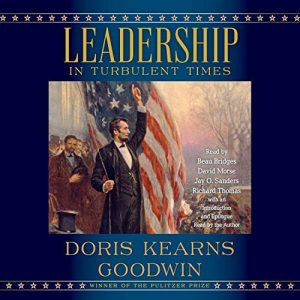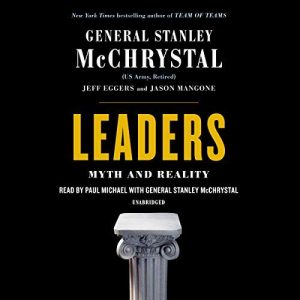Who should you trust to write about leadership? Academics generally can write more eloquently and more persuasively than practicing leaders, but can they appreciate it as well? There is no such thing as writing history as it really was. All history is a creation of historians, or the storyteller, who decides what to leave in and what to take out of the story. The historian also imposes a paradigm on the account. The paradigm is not the whole truth. It cannot be. It is a simplification, a model that we can understand.
A good model includes as much detail and nuance as possible w/o becoming so complicated that it is incomprehensible, and a good historian puts events in context that makes them meaningful while keeping to the basic truth. It is a tall order.
I recently finished a couple books with leadership in their titles and cases of leadership as their themes.
“Leadership” by Doris Kearns Goodwin is a classical narrative history by a renowned academic historian. She considers of the leadership challenges of four presidents: Abraham Lincoln, Theodore Roosevelt, Franklin D. Roosevelt, and Lyndon B. Johnson. She knows them well from studying them for her lifetime. She worked briefly with Johnson himself. She is a superbly credentialed historian, with no significant experience as a leader. Stanley McChrystal in some ways is the opposite. He is a trained and experienced leader w/o significant academic credentials. His book, “Leaders: Myth & Reality,” is not as good from the academic point of view. His narratives do not seem to flow as well, and the book could have been edited to about half its length w/o losing meaning. His method is based on the classic historian Plutarch and features paired biographies in categories of geniuses, founders, politicians, reformers, heroes & zealots, and so a broader field than Goodwin’s. He also is more concerned with the environments, constraints, uncertainty and even random chance that leaders face.
McChrystal’s narrative is less concise and focused because he is less skilled at academic writing than Goodwin, but also because he is accounting for more variables and more complex interaction among them. I think this points to a fundamental challenge for those looking to understand leadership. Those that do tend not to write, or at least do not write as convincingly, and those who write do not do.
There are notable exceptions. Churchill, Caesar and Thucydides leap to mind as practitioners who wrote clearly and compellingly, but many of the most influential writers of history and most of the “system builders” like Hegel, Marx, Spengler, Toynbee or more recently Howard Zinn, never led as much as a Johnny detail.
I suppose it is a question of how much we can know and how much we need to know. Many great leaders never studied the “science of leadership” and maybe that is good. Leadership often tends to be situational and maybe the particulars of the circumstances are more important than the general. Stories of great leadership tend to include lots of hindsight insights and myths. Maybe this is okay too. Some of these stories are be inspirational or didactic.
Leopold von Ranke, the “historian’s historian” emphasized that history should be told “the way it happened” and we should not give up rigor, but maybe we need to consider within the limits what can be known about the way it happened and what we have the capacity to understand and use.


